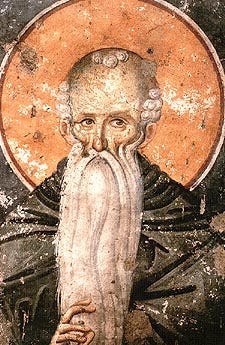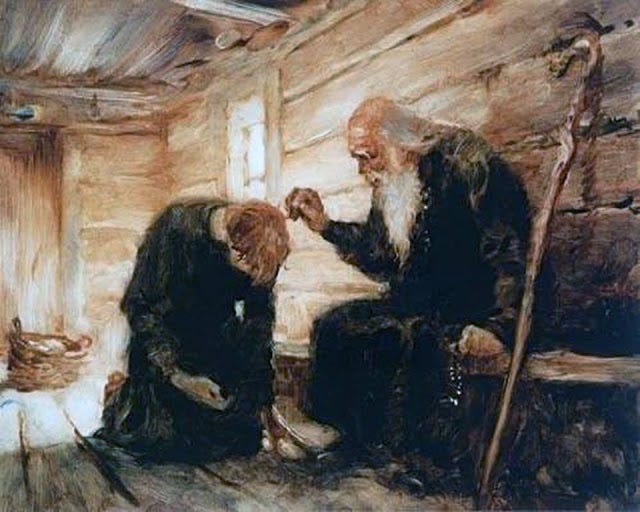Daily Scripture Readings
Wisdom of Solomon 5:15-6:3 (Vespers, 1st reading)
15 But the righteous live for ever, and their reward is with the Lord; the Most High takes care of them.
16 Therefore they will receive a glorious crown and a beautiful diadem from the hand of the Lord, because with his right hand he will cover them, and with his arm he will shield them.
17 The Lord will take his zeal as his whole armor, and will arm all creation to repel his enemies;
18 he will put on righteousness as a breastplate, and wear impartial justice as a helmet;
19 he will take holiness as a invincible shield,
20 and sharpen stern wrath for a sword, and creation will join with him to fight against the madmen.
21 Shafts of lightning will fly with true aim, and will leap to the target as from a well-drawn bow of clouds,
22 and hailstones full of wrath will be hurled as from a catapult; the water of the sea will rage against them, and rivers will relentlessly overwhelm them;
23 a mighty wind will rise against them, and like a tempest it will winnow them away. Lawlessness will lay waste the whole earth, and evil-doing will overturn the thrones of rulers.
1 Listen therefore, O kings, and understand; learn, O judges of the ends of the earth.
2 Give ear, you that rule over multitudes, and boast of many nations.
3 For your dominion was given you from the Lord, and your sovereignty from the Most High, who will search out your works and inquire into your plans.
Mark 9:42-10:1 (Gospel)
42 But whoever causes one of these little ones who believe in Me to stumble, it would be better for him if a millstone were hung around his neck, and he were thrown into the sea.
43 If your hand causes you to sin, cut it off. It is better for you to enter into life maimed, rather than having two hands, to go to hell, into the fire that shall never be quenched –
44 where ‘Their worm does not die, and the fire is not quenched.’
45 And if your foot causes you to sin, cut it off. It is better for you to enter life lame, rather than having two feet, to be cast into hell, into the fire that shall never be quenched –
46 where ‘Their worm does not die, and the fire is not quenched.’
47 And if your eye causes you to sin, pluck it out. It is better for you to enter the kingdom of God with one eye, rather than having two eyes, to be cast into hell fire –
48 where ‘Their worm does not die, and the fire is not quenched.’
49 For everyone will be seasoned with fire, and every sacrifice will be seasoned with salt.
50 Salt is good, but if the salt loses its flavor, how will you season it? Have salt in yourselves, and have peace with one another.”
1 Then He arose from there and came to the region of Judea by the other side of the Jordan. And multitudes gathered to Him again, and as He was accustomed, He taught them again.
Ven. Euthymius the Great (473)
Saint Euthymius the Great came from the city of Melitene in Armenia, near the River Euphrates. His parents, Paul and Dionysia, were pious Christians of noble birth. After many years of marriage they remained childless, and in their sorrow they entreated God to give them offspring. Finally, they had a vision and heard a voice saying, “Be of good cheer! God will grant you a son, who will bring joy to the churches.” The child was named Euthymius (“good cheer”).
Saint Euthymius’ father died soon after this, and his mother, fulfilling her vow to dedicate her son to God, gave him to her brother, the priest Eudoxius, to be educated. He presented the child to Bishop Eutroius of Melitene, who accepted him with love. Seeing his good conduct, the bishop soon made him a Reader.
Saint Euthymius later became a monk and was ordained to the holy priesthood. At the same time, he was entrusted with the supervision of all the city monasteries. Saint Euthymius often visited the monastery of Saint Polyeuctus, and during Great Lent he withdrew into the wilderness. His responsibility for the monasteries weighed heavily upon the ascetic, and conflicted with his desire for stillness, so he secretly left the city and headed to Jerusalem. After venerating the holy shrines, he visited the Fathers in the desert.
Since there was a solitary cell in the Tharan lavra, he settled into it, earning his living by weaving baskets. Nearby, his neighbor Saint Theoctistus (September 3) also lived in asceticism. They shared the same zeal for God and for spiritual struggles, and each strove to attain what the other desired. They had such love for one another that they seemed to share one soul and one will.
Every year, after the Feast of Theophany, they withdrew into the desert of Coutila (not far from Jericho). One day, they entered a steep and terrifying gorge with a stream running through it. They saw a cave upon a cliff, and settled there. The Lord, however, soon revealed their solitary place for the benefit of many people. Shepherds driving their flocks came upon the cave and saw the monks. They went back to the village and told people about the ascetics living there.
People seeking spiritual benefit began to visit the hermits and brought them food. Gradually, a monastic community grew up around them. Several monks came from the Tharan monastery, among them Marinus and Luke. Saint Euthymius entrusted the supervision of the growing monastery to his friend Theoctistus.
Saint Euthymius exhorted the brethren to guard their thoughts. “Whoever desires to lead the monastic life should not follow his own will. He should be obedient and humble, and be mindful of the hour of death. He should fear the judgment and eternal fire, and seek the heavenly Kingdom.”
Know thyself
The importance of self-knowledge according to St. Nectarios the Wonderworker
The ancient Greek saying, “know thyself,” has been attributed to at least twelve ancient authors. In its original sense, learning to know oneself was a spiritual odyssey leading to the knowledge of God. Unfortunately, nowadays “know thyself” is often reduced, perhaps for the sake of building self esteem, to “know what thou art good at,” or “know thy gift,” or in a religious context, “know thy ministry.” It seems that the most important thing nowadays is that everyone feel that they are important, that they are good at something; and that this feeling of confidence and importance is what makes human beings healthy.
The Orthodox Church fathers and mothers, however, see things very differently. They see self esteem as the problem, not the solution. They consider that so long as one has high self esteem, one can not really begin to experience humility, which is the chief attribute of God–at least it is the chief attribute of God demonstrated in Christ’s condescension to become human–and it is the beginning or foundation of the ladder of virtues leading to Christlikeness.
Read what a modern saint, St. Nectarios has to say on the important topic of self-knowledge:
“Self-knowledge is man’s foremost duty. Man, as a rational, morally free and religious being, is a being of lofty rank and has been destined to become like God, in Whose image he was created, and a participant in Divine goodness and blessedness. But in order to become a divine likeness, good and blessed, and to commune with God, man must first of all know himself. Without self-knowledge man goes astray in his thoughts, is dominated by diverse passions, tyrannized by violent desires, troubled about many and vain things, and leads a disorderly, distracted life, erring in all things, wandering on the way, staggering at every step; and he stumbles, falls, and is crushed. He drinks every day potions of sorrow and bitterness, fills his heart with grief, and lives an unbearable life.”
“He who does not know himself does not know God, either. And he who does not know God does not know the truth and the nature of things in general… He who does not know himself continually sins against God and continually moves farther away from Him. He who does not know the nature of things and what they truly are in themselves is powerless to evaluate them according to their worth and to discriminate between the mean and the precious, the worthless and the valuable. Wherefore, such a person wears himself out in the pursuit of vain and trivial things, and is unconcerned about and indifferent to the things that are eternal and most precious.”
“There is in man by nature the power of self-knowledge, because man is a spiritual and morally free being, having free will and the power of knowing… But in order to acquire perfect knowledge of himself, man must first will and move towards self-inquiry and make himself an object of his study. Without willing, none of the things that ought to be done can be done.
Unless one wills, one’s moral powers remain idle, no wise leading their possessor to knowledge. The will activates them and renders them manifest. In man, the faculty of the will, strengthened by the faculty of reason and that of free choice and self-control, overcomes all obstacles and succeeds in everything: ‘I will’ becomes ‘I can’ in the man that acts with knowledge and freedom.”
“Man ought to will to know himself, to know himself, to know God, and to understand the nature of things as they are in themselves, and thus become an image and likeness of God.”
“Those who know themselves are praised in adages as wise. The writer of the Proverbs, Solomon, says: “Those who know themselves are wise;” (Prov. 13:10) and he advises: “Know thyself and walk in the ways of your heart blameless.” (Eccl. 11:9)”
“The need of knowing ourselves has been taught by both religion and philosophy. Thales the Milesian held that the beginning of all the virtues is self-knowledge. The Oracle at Delphi called self-knowledge “the foremost and best part of true knowledge.” Clearly, then, self-knowledge is the beginning of all virtue and wisdom. Now if the precept “Know thyself” is imposed upon us by our cognitive power as a Divine law written in our mind, we ought, as rational and morally free beings, to respect it and observe it.”
“He who knows himself knows his duties towards himself, towards God, and towards his neighbour, and that piety, justice, truth and knowledge should be for him the touchstone on which he tests all his acts that have reference to God, to himself, and to his neighbour… He who knows himself is never puffed up, never filled with pride, but first of all he knows his shortcomings and faults, always comparing himself with the ideal prototype, in the likeness of which he ought to develop himself, inasmuch as he sees how much he falls short of it.”
Source: Modern Orthodox Saints Vol. 7 St Nectarios of Aegina by Constantine Cavarnos
This week’s calendar reminders:
Monday 1/20: Matins 8:30 am
Tuesday 1/21: no services or events
Wednesday 1/22: no services or events
Thursday 1/23: Matins 8:30 am; Men’s group 7pm
Friday 1/24: Matins 8:30 am
Saturday 1/25: Catechumen class 4:30 pm; Great Vespers 6 pm
Sunday 1/26: Divine Liturgy 9:15am
Christ the Savior Orthodox Church is located in Southbury, Connecticut, and is part of the New England Diocese of the Orthodox Church of America.
Mailing address: Christ the Savior Church, 1070 Roxbury Road, Southbury, CT 06488
PLEASE DONATE to help our parish do the work of the Lord, thrive and grow, and extend the Kingdom of God. May the Lord bless your generosity!
Fr. Moses Locke can be reached at frmoseslocke@gmail.com











